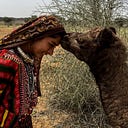Kenyan pastoralist women build up adaptive capacity amid climate crisis
As the drought crisis gets worse in northern Kenya, women in the East African country initiate projects like reforestation and conservation of watersheds.
Source: Xinhua, Editor: Huaxia
Nuria Gollo, a livestock keeper and gender rights advocate from the vast northern Kenyan county of Marsabit that neighbours Ethiopia said that losing nearly all her cows and goats to the raging drought in her backyard has been traumatizing.
The 50-year-old mother of five said that the worst drought to hit a large swathe of northern Kenya in four decades has upended the livelihoods of herders and subsistence farmers, pushing them to the brink of starvation and financial ruin.
She described the devastation that the climate crisis has brought to the nomadic communities in Marsabit, Kenya’s largest county, saying that women, despite being the victims, have also taken the mantle to confront the phenomenon. According to Gollo, as nomadic women and girls face a bleak future due to climate change, a good number of them have also risen to the occasion to offer solutions by leveraging indigenous knowledge to help boost the resilience of grassroots communities and their ecosystems.
Gollo said the tenacity and resilience of pastoralist women in the face of the climate crisis has manifested itself prominently as they initiate projects like reforestation and conservation of watersheds to boost the adaptive capacity of households. She added that women and girls in Kenya’s northern frontier districts have been on the frontline of climate response, motivated by the desire to bequeath a green, hopeful and prosperous future for their children.
Rehema, a 19-year-old gender rights advocate from Kenya’s coastal county of Kwale, said that young girls in her backyard have taken up the search for climate justice, having borne the brunt of food insecurity and water scarcity that has worsened in the current drought season.
“It is us girls who are dropping out of school or trekking many kilometres in search of water and have therefore resolved to be champions of a climate-resilient future,” said Rehema.
